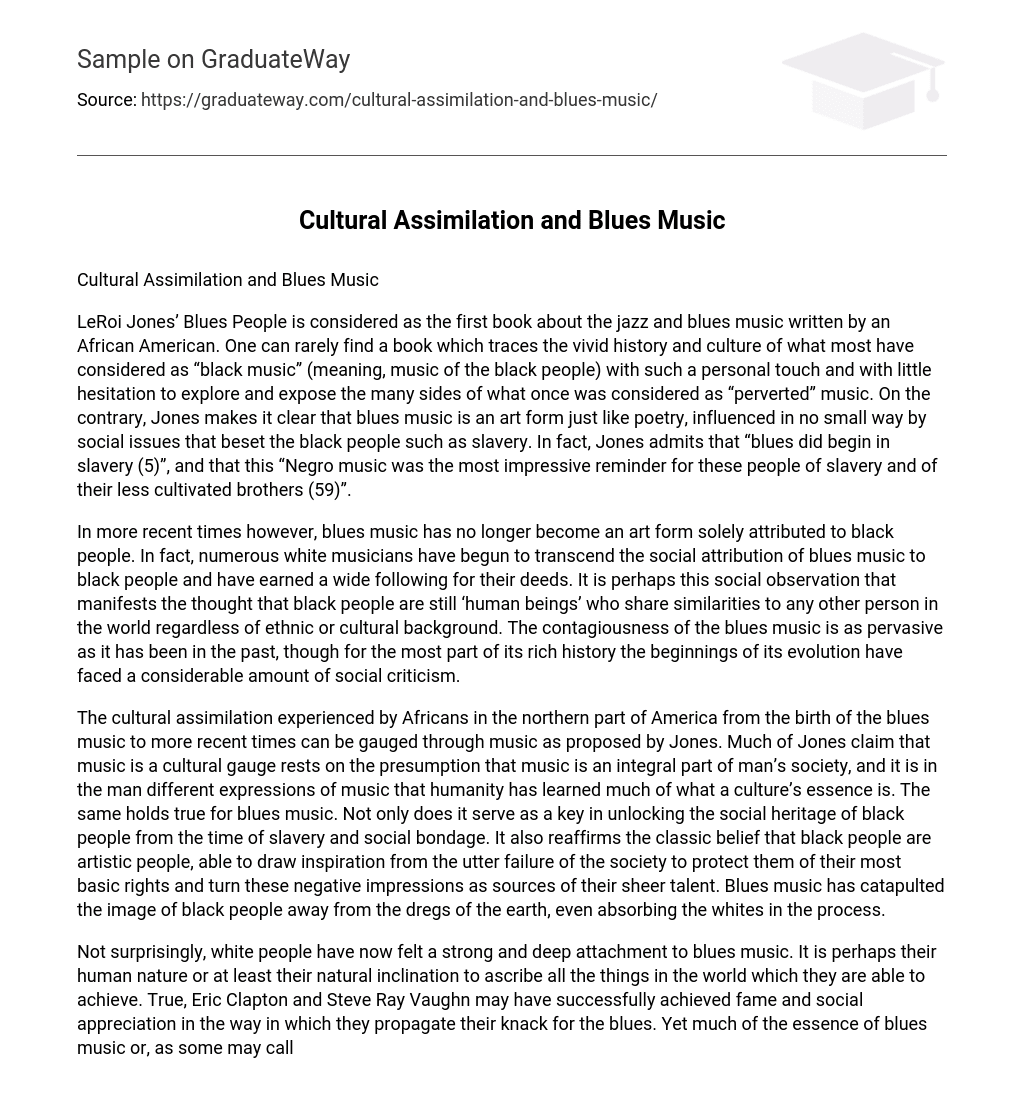LeRoi Jones’ Blues People is considered as the first book about the jazz and blues music written by an African American. One can rarely find a book which traces the vivid history and culture of what most have considered as “black music” (meaning, music of the black people) with such a personal touch and with little hesitation to explore and expose the many sides of what once was considered as “perverted” music. On the contrary, Jones makes it clear that blues music is an art form just like poetry, influenced in no small way by social issues that beset the black people such as slavery. In fact, Jones admits that “blues did begin in slavery (5)”, and that this “Negro music was the most impressive reminder for these people of slavery and of their less cultivated brothers (59)”.
In more recent times however, blues music has no longer become an art form solely attributed to black people. In fact, numerous white musicians have begun to transcend the social attribution of blues music to black people and have earned a wide following for their deeds. It is perhaps this social observation that manifests the thought that black people are still ‘human beings’ who share similarities to any other person in the world regardless of ethnic or cultural background. The contagiousness of the blues music is as pervasive as it has been in the past, though for the most part of its rich history the beginnings of its evolution have faced a considerable amount of social criticism.
The cultural assimilation experienced by Africans in the northern part of America from the birth of the blues music to more recent times can be gauged through music as proposed by Jones. Much of Jones claim that music is a cultural gauge rests on the presumption that music is an integral part of man’s society, and it is in the man different expressions of music that humanity has learned much of what a culture’s essence is. The same holds true for blues music. Not only does it serve as a key in unlocking the social heritage of black people from the time of slavery and social bondage. It also reaffirms the classic belief that black people are artistic people, able to draw inspiration from the utter failure of the society to protect them of their most basic rights and turn these negative impressions as sources of their sheer talent. Blues music has catapulted the image of black people away from the dregs of the earth, even absorbing the whites in the process.
Not surprisingly, white people have now felt a strong and deep attachment to blues music. It is perhaps their human nature or at least their natural inclination to ascribe all the things in the world which they are able to achieve. True, Eric Clapton and Steve Ray Vaughn may have successfully achieved fame and social appreciation in the way in which they propagate their knack for the blues. Yet much of the essence of blues music or, as some may call it, “black music” still rests on those people who have a real footing on the blues—the “slaves of the past” who we call the black people.
The blues is perhaps one of the many achievements and contributions of black African Americans to human civilization. It is the irony of the situation where for once blacks were regarded as ‘less-than-human’ when in fact many people were humanized by no less than their efforts and struggles to make life a little less uncomfortable and a lot more artistic for people. Though not every struggle is repaid with acceptance and awe, the blues music has become a pervasive art form able to withstand the toils of time, whether or not the music of today is experiencing the same evolution as it was in the past. Blues music has bee a force to reckon with, one that is contagious enough to liberate the senses and sensibilities of the public and music enthusiasts. Blues music is indeed a social gauge which is able to measure the cultural assimilation experienced by African Americans in North America and beyond.
Works Cited
Jones, LeRoi. Blues People: Negro Music in White America. 1 ed: Harper Perennial, 1999.





